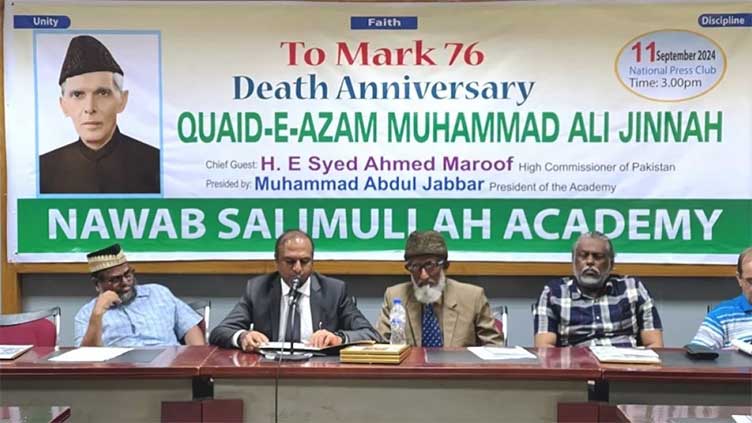Death anniversary of Quaid-e-Azam marked in Bangladesh

Pakistan
A discussion session was organised by the Nawab Salimullah Academy at the Press Club
(Web Desk) – The 76th death anniversary of the founder of Pakistan, Muhammad Ali Jinnah, was marked at the National Press Club in Dhaka on September 11.
The function was attended by Pakistan’s Deputy High Commissioner Kamran Dhangal as the high commissioner could not turn up, reported Bangladesh media.
A discussion session was organised by the Nawab Salimullah Academy at the Tofazzal Hossain Manik Miah Hall of the Press Club.
The participants agreed that Pakistan would not have been created had Mr Jinnah not led the Muslim of the subcontinent. And “without Pakistan, Bangladesh too would not exist.”
They highlighted various aspect of the life on Jinnah, who is popularly known in Pakistan as the Quaid-e-Azam.
Prof Dr Mostafizur Rahman was the keynote speaker.
Jafarul Haq Jafar recited an Urdu poem about Jinnah, while two Pakistani students studying in Bangladesh, Mohammad Tahir and Kamran Abbas, sang songs in Urdu dedicated to him.
The event, presided over by the academy's president, Muhammad Abdul Jabbar, was also attended by the convener of Nagorik Parishad Muhammad Samsuddin and journalist Mostafa Kamal Mojumder, among others.
"If Bangladesh had not been part of Pakistan in 1947, we would have been in the same position as Kashmir today, with the Indian junta holding weapons to our necks. Bangladesh gained independence because of Pakistan, which Jinnah helped create," Samsuddin said.
"Why should we change the name of Allama Iqbal Hall or Jinnah Avenue? These changes were made because Delhi wanted them, but we did not. Bangladesh must foster strong relations with China and Pakistan."
Deputy High Commissioner Dhangal said Jinnah's leadership in the Muslim League had been outstanding. “It was the beginning of an important mass movement for the Muslims of India.”
He said that the Quaid’s “vision for the new nation was clear. He advocated for a progressive and inclusive state, reflecting a commitment to freedom and tolerance. His contributions were not only revered in Pakistan but also across the world.”


